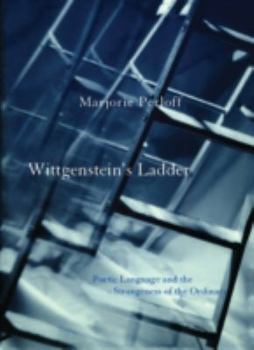Wittgenstein's Ladder: Poetic Language and the Strangeness of the Ordinary
Select Format
Select Condition 
Book Overview
Marjorie Perloff, among our foremost critics of twentieth-century poetry, argues that Ludwig Wittgenstein provided writers with a radical new aesthetic, a key to recognizing the inescapable strangeness of ordinary language. Taking seriously Wittgenstein's remark that "philosophy ought really to be written only as a form of poetry," Perloff begins by discussing Wittgenstein the "poet." What we learn is that the poetics of everyday life is anything...
Format:Paperback
Language:English
ISBN:0226660605
ISBN13:9780226660608
Release Date:March 1999
Publisher:University of Chicago Press
Length:306 Pages
Weight:0.90 lbs.
Dimensions:0.8" x 5.9" x 8.2"
Customer Reviews
3 ratings
An Easy Climb
Published by Thriftbooks.com User , 21 years ago
This is an engaging, down-to-earth book about the connections between Wittgenstein's aphoristic philosophy and some of the 20th-century writers who've followed his lead up the 'ladder of the ordinary.' Perloff's at her best with the close readings of difficult writers like Stein, Beckett and Creeley, who magically flower into comprehensibility under her sharp attention and good sense. The authors she chooses to illustrate Wittgenstein's influence seemed a little arbitrary to me though. She admits that Beckett and Stein didn't read Wittgenstein, and that Wittgenstein would probably have disliked their art. So why put them 'under his sign'? It makes more sense to me to see Wittgenstein as part of a wider generation who felt dissatisfied with the pre-war language they'd inherited. With later poets like Silliman and Waldrop, who explicitly cite Wittgenstein's writings as an inspiration, I think Perloff misses what separates them from Wittgenstein: he had no earlier model to cite. Wittgenstein's faith in ordinary language led to a manner of writing and thinking that was largely self-sufficient--an interested reader can dive right in and think through the problems for herself. His more allusive postmodern heirs rely to a large extent on your prior knowledge of texts like Wittgenstein's for their effects. Where Wittgenstein himself struggled to keep his religious and hierarchical values in check through the discipline of ordinary language--concepts like beauty, God and the self seemed to have some meaning for him, you just couldn't talk about those meanings with language--later writers' easy acceptance of notions like a language game, the 'constructed self' and the fundamental indeterminacy of language seems to drain some of the drama from their writing. You don't feel the same struggle (or modesty) that you sense in Wittgenstein's open, user-friendly illustrations. Describing one of his poems, Ron Silliman writes: "Every sentence is supposed to remind the reader of his or her inability to respond." I can't imagine Wittgenstein saying something like that.Still, the book is an interesting take on Wittgenstein and the poetic he unwittingly inspired. Well worth reading.
Perloff captures Wittgenstein's poetic insights.
Published by Thriftbooks.com User , 25 years ago
Anyone interested in either Wittgenstein or poetry should read this book. It does a remarkably good job of both philosophical and literary analysis, making the case that poetry, like philosophy as conceived by Wittgenstein, embodies the curious collision of the mystical with the mundane which best demonstrates the limits of language. Tightly reasoned and methodical, the book explains why Wittgenstein has had so much influence on aesthetic and ethical projects of the Twentieth Century, and suggests why that will continue. "The pursuit of the ordinary may well be the most interesting game in town."
The range and reach, again, is amazing per se.
Published by Thriftbooks.com User , 25 years ago
The range and reach of M Perloff, again, is amazing per se in this helpful book on language forms and social poetics, but more than that her lifelong work has proven her to be the rightful heir to Jack Spicer and Josephine Miles as the "genuis loci" of westcoast multi-lingual US poetics. In that sense, she can said to be preserving US poesy from the forms and formulae of Yvor Winters and his school of moral prosody and common sense thinking. We need Marjorie Perloff to write like we need the air, light, and sun over the Hudson River valley. But the stables of "official verse culture" are full of lyric manure, and the job of building a different vision of US cultural poetics and lyric poesy is endless. Stein, Wiggenstein, and Perloff bring tools that help in the struggle in Hawai'i, or Amherst, or anywhere USA.






